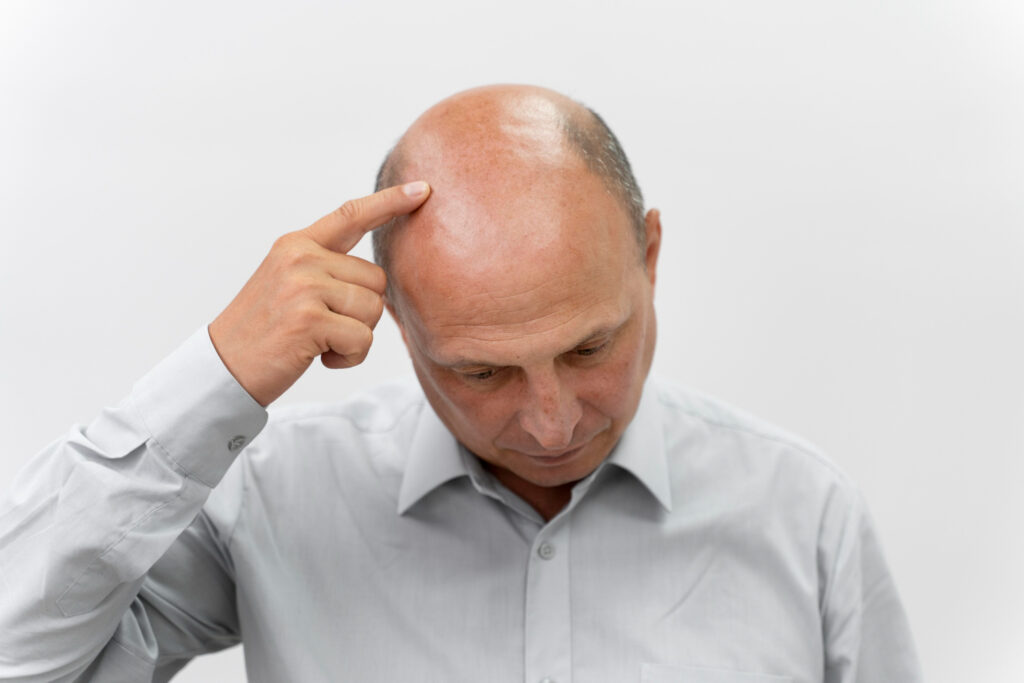Finding hair on your pillow or in the shower drain can trigger instant panic. But before you start stressing about going bald, let’s take a deep breath and look at what’s actually normal when it comes to daily hair shedding.
The Reality Check: How Many Hairs Should You Normally Lose?
Ever caught yourself counting fallen hairs with growing anxiety? You’re not alone. Many guys experience that sinking feeling when they notice hair in the sink. But here’s the truth that might surprise you: losing 50-100 hairs per day is completely normal for most people.
Yes, you read that right. Our hair naturally goes through cycles of growth, rest, and shedding. At any given time, about 90% of your hair is in the active growth phase (anagen), while the remaining 10% is either in the transition phase (catagen) or resting phase (telogen) before falling out.
“Most men dramatically overestimate how much hair they’re actually losing,” says Dr. James Williams, a hair and scalp specialist. “The average scalp has about 100,000 hair follicles, so losing 100 hairs daily represents just 0.1% of your total hair.”
When Should You Start Paying Attention?
While some daily hair loss is normal, certain patterns might warrant closer attention:
- Sudden increase in hair shedding: If you notice significantly more hair falling out than usual
- Visible thinning: Especially at the crown or hairline
- Hair loss patterns: Recession at the temples forming an “M” shape
- Family history: Male pattern baldness often runs in families
Remember that seasonal changes, stress, diet modifications, or even changing your hair products can temporarily increase shedding without indicating a long-term problem.
The Stress-Hair Loss Connection: A Vicious Cycle
Here’s where things get interesting: worrying about hair loss can actually… cause more hair loss. It’s nature’s cruel joke.
When you’re stressed, your body produces more cortisol (the stress hormone), which can push more hair follicles into the resting phase prematurely. This condition, called telogen effluvium, can increase hair shedding for several months.
“I see this all the time with my clients,” says trichologist Sarah Bennett. “They notice a few extra hairs falling out, panic about going bald, and the resulting stress actually accelerates the shedding. Breaking this cycle is essential.”
The Hair Health Lifestyle: What You Can Control
Instead of obsessing over hair counts, focus on overall hair health habits:
1. Watch Your Grooming Routine
- Go easy on heat styling: Excessive heat damages hair and can increase breakage
- Choose the right brush: Wide-toothed combs cause less breakage than fine-toothed ones
- Be gentle when towel-drying: Rough drying creates friction that weakens hair
2. Nutrition Matters
- Protein power: Hair is primarily made of protein, so ensure adequate intake
- Iron and zinc: Deficiencies in these minerals have been linked to hair shedding
- Healthy fats: Omega-3s support scalp health and reduce inflammation
3. Lifestyle Adjustments
- Sleep quality: Your body repairs tissues, including hair follicles, during sleep
- Exercise regularly: Improved circulation benefits hair follicles
- Hydration: Proper water intake supports overall cell health, including follicles
4. Stress Management
- Mindfulness practices: Meditation and deep breathing can lower cortisol levels
- Physical activity: Regular exercise is a proven stress reducer
- Adequate downtime: Schedule relaxation into your routine
When to Talk to a Professional
While this article provides general information, personalized advice requires professional consultation. Consider speaking with a healthcare provider if:
- Hair loss is sudden or severe
- You notice scalp irritation, redness, or pain
- Hair loss is accompanied by other symptoms
- You’re concerned about medication side effects
Some hair shedding is completely normal and doesn’t mean you’re on the fast track to baldness. Most importantly, worrying about normal hair loss can create stress that actually worsens the situation.
Focus on overall hair and scalp health rather than counting every fallen strand. And remember—confidence looks good with any amount of hair.

Disclaimer: This article is intended for informational purposes only and does not constitute medical advice. The information provided should not be used for diagnosing or treating health problems or diseases. If you have or suspect you have a medical problem, consult with a healthcare professional. The authors and publishers of this article are not responsible for any adverse effects resulting from the use of any suggestions, preparations, or procedures described in this content.



